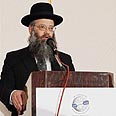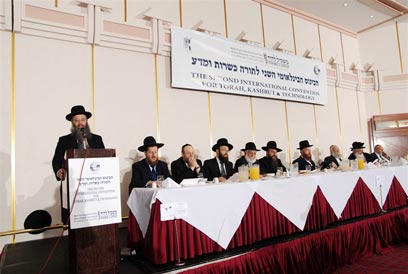
Rabbi Aharon Nesher
Kosher conference decides fate of shrimp, vodka
Representatives from 40 countries, kosher authorities participate in Jerusalem convention, discuss latest culinary developments like kosher shrimp as well as unseen dangers like horse milk in vodka
Passover mazot for celiac patients, rabbinical supervision via the internet, vodka with non-kosher dairy components and second-rate Chinese seafood as kosher shrimps – these are only some of the gastronomic innovations discussed at the four-day-long kosher convention recently held in Jerusalem at the Renaissance Hotel.

Kashrut Convention (Photo: Meir Holtovsky)
Representatives and Rabbis from 40 countries attended the convention, which was organized by the kashrut institute Maskil L’David.
The goal of the convention was to exchange information and share opinions about innovations in food technology, and to set new standards with regards to how to deal with genetic engineering of food products.
Rabbi Akiva Yosef Padwa, a world renowned expert on the kashrut of alcoholic beverages, shared his recently acquired knowledge of some alcohol factories mixing horse milk into drinks.
A relatively new product on the market is kosher shrimp, samples of which were brought to the convention. The pseudo shrimp is made of Alaska Pollock fish, which can be found in the China Sea.
Previously, Alaska Pollock was relatively cheap in comparison to shrimp and calamari, earning itself the nickname “a poor man’s shrimp”. Kashrut officials inspected the fish and found that it was strictly kosher.
‘Truth, not business’
The Maskil L’David organization has two golden rules: it doesn’t give kashrut certificates, and it avoids ruling on Halachic issues. The objective of the organization is to follow scientific developments and provide scientific and Halachic information to kashrut givers and consumers.
Rabbi Aharon Nesher, chairman of Maskil L’David said that the selection of kashrut institutions made it difficult for consumers to decide on which kosher products to buy.
Nesher told Ynet that he would like to see the different institutions join together to form bigger institutions, making kashrut “more based on truth, and less based on business”.
The rabbi also said that he believed the increase of consumer power depended on the information consumers have.
“We want the public to know what Halachic kashrut is, not just to be satisfied with a kashrut stamp as a marketing hook. For example, consumers should know there is no need for kashrut on mineral water,” he concluded.










